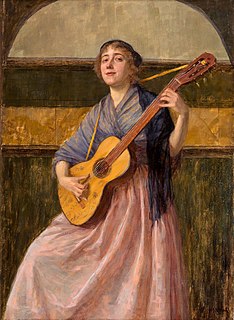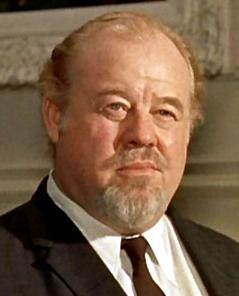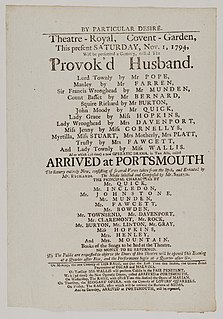Related Research Articles

A ballad is a form of verse, often a narrative set to music. Ballads derive from the medieval French chanson balladée or ballade, which were originally "dance songs". Ballads were particularly characteristic of the popular poetry and song of Britain and Ireland from the later medieval period until the 19th century. They were widely used across Europe, and later in Australia, North Africa, North America and South America. Ballads are often 13 lines with an ABABBCBC form, consisting of couplets of rhymed verse, each of 14 syllables. Another common form is ABAB or ABCB repeated, in alternating eight and six syllable lines.

Burl Icle Ivanhoe Ives was an American singer, musician, actor, and author.

The ballad opera is a genre of English stage entertainment that originated in the early 18th century, and continued to develop over the following century and later. Like the earlier comédie en vaudeville and the later Singspiel, its distinguishing characteristic is the use of tunes in a popular style with spoken dialogue. These English plays were 'operas' mainly insofar as they satirized the conventions of the imported opera seria. Music critic Peter Gammond describes the ballad opera as "an important step in the emancipation of both the musical stage and the popular song."

Earl Hawley Robinson was a composer, arranger and folk music singer-songwriter from Seattle, Washington. Robinson is remembered for his music, including the cantata "Ballad for Americans" and songs such as "Joe Hill" and "Black and White", which expressed his left-leaning political views. He wrote many popular songs and music for Hollywood films, including his collaboration with Lewis Allan on the 1940's hit "The House We live in" from the academy award winning film by the same name. He was a member of the Communist Party from the 1930s to the 1950s.
Ballad is a form of narrative poetry, often put to music, or a type of sentimental love song in modern popular music.

The Tragedy of Lady Jane Grey, often shortened to Lady Jane Grey, is a 1715 tragedy by the British writer Nicholas Rowe. It portrays the brief reign of Lady Jane Grey, a pretender to the English throne following the death of Edward VI and her defeat and execution by Mary I in 1554. The title role was played by the prominent actress Anne Oldfield. The cast also included John Mills as the Duke of Northumberland, Barton Booth as Lord Guilford Dudley and Lacy Ryan as the Earl of Sussex, Colley Cibber as Bishop Gardiner, James Quin as the Lieutenant of the Tower and Mary Porter as the Duchess of Suffolk.
The Wife of Bath is a 1713 comedy play by the British writer John Gay. It was inspired by the The Wife of Bath's Tale by Geoffrey Chaucer. The play marked a conscious switch by Gay towards an apolitical and distant past, after his contemporary work The Mohocks had faced controversy and censorship the previous year. Robert Wilks, a celebrated actor and manager of the Drury Lane Theatre, appeared as Chaucer. The title role of the wife was played by Margaret Bicknell with Mary Porter as Myrtilla and the cast rounded out by William Bullock, Lacy Ryan, Christopher Bullock, William Pinkethman, Susanna Mountfort and Henry Norris.
The What D'Ye Call It is a 1715 farce by the British writer John Gay. It was written as a parody of tragic plays, with particular reference to Thomas Otway's Venice Preserv'd.
A Woman's Revenge, or a Match in Newgate is a 1715 comedy play by the British writer Christopher Bullock. It was originally performed as an afterpiece to another work The Lucky Prodigal. With its Newgate Prison setting and cynical references to corruption, it could be regarded as a precursor to John Gay's hit The Beggar's Opera of a decade later.
Gabriel Odingsells (1690–1734) was a British playwright.
Hob's Wedding is a 1720 farce by the Irish writer John Leigh.

The Village Opera is a 1729 ballad opera by the British writer Charles Johnson. It was part of a group of ballad operas produced in the wake of the great success of John Gay's The Beggar's Opera.

The Provoked Husband is a 1728 comedy play by the British writer and actor Colley Cibber, based on a fragment of play written by John Vanbrugh. It is also known by the longer title The Provok'd Husband: or, a Journey to London.
The Devil to Pay is a 1731 ballad opera by the Irish writer Charles Coffey and British writer John Mottley. Also known by the longer title The Devil to Pay: Or, The Wives Metamorphos'd, it was part of a group of ballad operas produced in the wake of the success of John Gay's The Beggar's Opera. The work is inspired by Thomas Jevon's 1686 play The Devil of a Wife.
The Beggar's Wedding is a 1729 ballad opera by the Irish writer Charles Coffey. Part of a boom in ballad operas following the success of John Gay's The Beggar's Opera, it originally premiered at the Smock Alley Theatre in Dublin in March 1729 before appearing in London at the Haymarket Theatre on 29 May 1729 The original Dublin cast included Richard Elrington.
Love in a Riddle is a 1729 ballad opera by the British actor-manager Colley Cibber. It was part of a boom in ballad operas inspired by the enormous success of John Gay's The Beggar's Opera the previous year.
Bayes's Opera is a 1730 ballad opera by the British writer Gabriel Odingsells. It was part of a boom in ballad operas that followed in the wake of the susccess of John Gay's The Beggar's Opera.
The Fatal Legacy is a 1723 tragedy by the British writer Jane Robe. It was inspired by Jean Racine's 1664 play La Thébaïde. It concerns the children of Oedipus in Ancient Thebes.
The Virgin Prophetess, or The Fate of Troy is a 1701 tragedy by Elkanah Settle featuring music by Gottfried Finger. It is a semi-opera with masque-like elements breaking up the scenes.
References
- ↑ Burling p.137